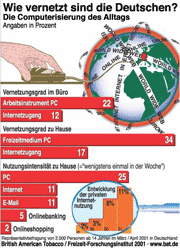The transparent consumer
Fear of data theft on the internet:
Almost every second PC user "abstains" from surfing the Internet
More and more private data is travelling around the world. Nothing is considered secure anymore because every PC user leaves traces on the Internet. Whether home banking or online shopping - the transparent person is becoming a reality. Personal data can be misused at any time when making purchases or banking transactions. Insecurity in dealing with personal data is becoming the biggest obstacle to the realisation of the political demand "Internet for all". More than two out of five German citizens (45%) who use a computer for business or private purposes voluntarily refrain from surfing the Internet in order to avoid data security issues. And only one in four PC users (25%) feel properly informed about how they can effectively protect their own data. These are the findings of the new study "The Transparent Consumer", in which the British American Tobacco Leisure Research Institute surveyed 2,000 German citizens aged 14 and over about their views on data protection and privacy in the age of the Internet.
"It's not network access and computer skills that will determine whether the Internet revolution becomes widely accepted," says Institute Director Prof Dr Horst W. Opaschowski. "It's more about PC users" fear of data theft on the Internet". Never before has it been so easy to access people's personal data as it is today. The electronic network has become the largest data collection machine in the world. It contains consumer data ranging from clothing sizes to shoe numbers as well as financial data from bank statements to tax returns.
Off to the net?
The degree of networking of the German population
One in five Germans (22%) use a PC at work, one in three (34%) at home. Internet access in the office is available to 12 per cent of the population. And one in six Germans (17%) can make use of online services at home. However, the degree of connectivity of the population says little about the actual intensity of use. Only one in four Germans (25%) uses a PC at home "at least once a week". Only one in nine private consumers surfs the Internet regularly - albeit with a growing tendency (1996: 2% - 1998: 3% - 2000: 8% - 2001: 11%).
In recent years, communication networks have become a permanent fixture in a large number of German households. Almost unnoticed, a constantly growing number of people have been connected to an information network. According to the media industry, the number of people and households with network access is set to grow even further in the coming years. At the end of such a gigantic expansion, a whole pool of digital media services will be available to everyone via these communication networks: pay TV, online services, home banking and virtual shopping. "Is the internet becoming an open invitation for data misuse?" asks Institute Director Opaschowski. "The protection of personal data - from the protection of minors to consumer protection - will become increasingly important in the future." People are currently being connected to the Internet en masse ("Internet for all"). However, it is just as important to inform and educate them about the associated risks on a broad scale beforehand.
The study "The transparent consumer. The future of data protection and privacy in a networked world" is available for a nominal fee of EUR 9.80 from the Leisure Research Institute of British-American Tobacco (Germany) GmbH, Alsterufer 4, 20354 Hamburg (phone 040/4151 2288 - fax 040/4151 3231 - e-mail Freizeitforschung@bat.de). The study contains charts, tables and comments on the degree of networking among Germans and provides information on the population's attitude to data storage and data protection, video surveillance and data misuse.
See also directory of all publications



